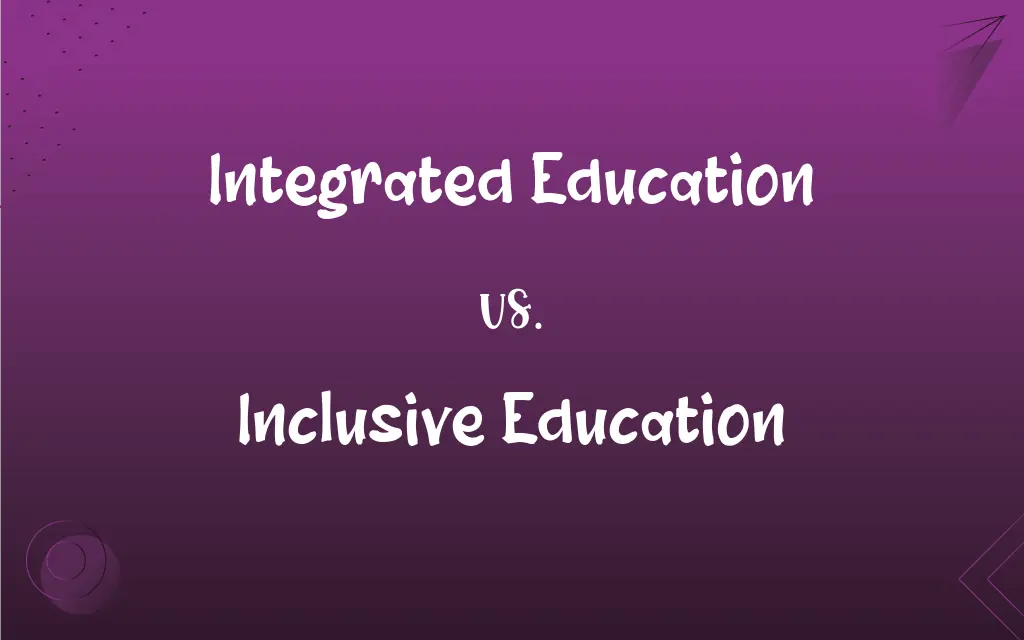Integrated Education vs. Inclusive Education: What's the Difference?
Edited by Aimie Carlson || By Janet White || Published on February 27, 2024
Integrated education involves placing students with disabilities in mainstream classes, while inclusive education ensures all students, regardless of ability, are part of the general education setting.

Key Differences
Integrated education and inclusive education are two approaches in the educational sphere that focus on accommodating diverse student populations, but they differ significantly in their principles and execution. Integrated education typically refers to the merging of students from different social, racial, or educational backgrounds into a common educational setting. This approach aims to foster a sense of unity and understanding among diverse groups. On the other hand, inclusive education is centered around the idea of including students with special educational needs or disabilities in mainstream classrooms. It emphasizes the modification of teaching methods, curricula, and environments to cater to the diverse needs of all students.
The concept of integrated education often involves combining students from previously segregated settings, such as those based on race or ethnicity, into a unified educational environment. The goal is to break down barriers and promote equality. In contrast, inclusive education primarily focuses on students with disabilities or learning differences, ensuring that they are not segregated but are taught alongside their peers in a supportive and accommodating environment. Inclusive education thus prioritizes accessibility and personalized learning approaches to ensure all students, regardless of their abilities or disabilities, can learn together.
When discussing integrated education, the emphasis is on creating a harmonious environment where students from different backgrounds can learn from and with each other. This approach seeks to reduce prejudice and promote mutual respect. In the context of inclusive education, the focus shifts to recognizing and valuing individual differences, advocating for the rights of students with disabilities to receive an education alongside their non-disabled peers. Inclusive education is not just about physical integration but also about full participation and the achievement of all students.
In integrated education, diversity is seen as an asset that enhances the learning experience for all students. This approach encourages students to appreciate different perspectives and cultures. Inclusive education, however, goes a step further by actively identifying and removing barriers to learning and participation for students with special needs. It involves adapting teaching materials, teaching strategies, and assessment methods to ensure that all students have equal opportunities to succeed.
Comparison Chart
Focus
Placing students with disabilities in mainstream classes.
Adapting teaching methods and environments for all.
ADVERTISEMENT
Student Adaptation
Students adapt to standard classroom settings.
Classroom and curriculum adapt to students' needs.
Scope of Application
Primarily for students with disabilities.
For all students, including those with diverse backgrounds.
Teaching Approach
Standard teaching methods with added support.
Diverse, flexible teaching strategies for all learners.
Goal
Physical integration into standard educational settings.
Creating an accessible and engaging learning environment for all.
Integrated Education and Inclusive Education Definitions
Integrated Education
Integrated education refers to incorporating students with special needs into traditional classrooms.
Our school's integrated education program has been successful in including students with diverse learning abilities.
ADVERTISEMENT
Inclusive Education
Inclusive education is the practice of educating all students together, regardless of ability or disability.
Our school's inclusive education policy ensures that every child is valued and supported in their learning journey.
Integrated Education
Integrated education is the co-education of special needs students with their typically developing peers.
Integrated education fosters a sense of community and understanding among all students.
Inclusive Education
Inclusive education refers to an educational approach that embraces diversity and promotes equal participation.
Inclusive education aims to eliminate barriers and create an equitable learning environment for everyone.
Integrated Education
Integrated education combines students with and without disabilities in the same educational setting.
The new policy promotes integrated education, allowing children with special needs to study alongside their peers.
Inclusive Education
Inclusive education involves adapting curriculum and teaching methods to include students of all backgrounds.
The teacher uses inclusive education techniques to engage students from various cultural backgrounds.
Integrated Education
Integrated education is the practice of educating students with disabilities in regular classrooms.
Integrated education aims to provide equal learning opportunities for all students, regardless of their abilities.
Inclusive Education
Inclusive education is the integration of students with special educational needs into regular classrooms with appropriate support.
Through inclusive education, students with learning disabilities receive tailored support while participating in regular classes.
Integrated Education
Integrated education involves blending special education with general education.
The school’s approach to integrated education ensures that special education students receive instruction in general education settings.
Inclusive Education
Inclusive education encompasses teaching strategies that address the needs of all students.
Inclusive education is characterized by personalized learning plans to suit each student's unique needs.
FAQs
Can integrated education be considered a form of inclusive education?
Integrated education can be seen as a component of inclusive education, but inclusive education has a broader scope, focusing on all students.
What does inclusive education mean?
Inclusive education is about adapting teaching methods and the learning environment to accommodate all students' diverse needs.
Why is inclusive education important?
Inclusive education is important for promoting equal educational opportunities and respecting diversity in learning abilities and backgrounds.
How does integrated education differ from inclusive education?
Integrated education focuses on the physical inclusion of students with disabilities in standard classrooms, while inclusive education modifies teaching and curriculum to suit all students.
How does inclusive education benefit students without disabilities?
Inclusive education benefits all students by fostering a culture of diversity, empathy, and collaborative learning.
How do schools measure the success of integrated education programs?
Success is measured by the academic and social progress of students with disabilities within mainstream classrooms.
What is integrated education?
Integrated education refers to placing students with disabilities in mainstream classes with additional support.
Does integrated education require special training for teachers?
Yes, integrated education often requires teachers to have training in special education to support students with disabilities effectively.
Are inclusive classrooms beneficial for students with severe disabilities?
Yes, inclusive classrooms can be beneficial for students with severe disabilities, as they provide social integration and tailored educational support.
Is integrated education legally required?
Legal requirements vary by region, but many countries mandate some form of integrated education for students with disabilities.
What role do parents play in integrated education?
Parents play a crucial role in advocating for their children's needs and collaborating with schools in integrated education settings.
How does inclusive education address cultural diversity?
Inclusive education addresses cultural diversity by incorporating teaching methods and content that reflect various cultural backgrounds.
How does inclusive education affect classroom dynamics?
Inclusive education can positively affect classroom dynamics by promoting understanding, cooperation, and respect among all students.
What are the challenges of implementing integrated education?
Challenges include ensuring adequate resources, teacher training, and adapting teaching methods to meet the needs of students with disabilities.
Can inclusive education improve overall school performance?
Inclusive education can improve overall school performance by promoting an inclusive culture and enhancing learning for all students.
What training do teachers need for effective inclusive education?
Teachers need training in diverse instructional strategies, classroom management, and understanding different learning needs for effective inclusive education.
What types of support are provided in integrated education settings?
Support can include specialized instruction, classroom aides, and adaptive learning materials for students with disabilities.
What are the key principles of integrated education?
Key principles include providing equal access to education and ensuring that students with disabilities are part of mainstream classes.
Does inclusive education require changes to the curriculum?
Inclusive education often involves modifying the curriculum to make it accessible and engaging for all students.
How do inclusive practices support diverse learners?
Inclusive practices support diverse learners by providing personalized learning strategies and fostering an accepting educational environment.
About Author
Written by
Janet WhiteJanet White has been an esteemed writer and blogger for Difference Wiki. Holding a Master's degree in Science and Medical Journalism from the prestigious Boston University, she has consistently demonstrated her expertise and passion for her field. When she's not immersed in her work, Janet relishes her time exercising, delving into a good book, and cherishing moments with friends and family.
Edited by
Aimie CarlsonAimie Carlson, holding a master's degree in English literature, is a fervent English language enthusiast. She lends her writing talents to Difference Wiki, a prominent website that specializes in comparisons, offering readers insightful analyses that both captivate and inform.
































































